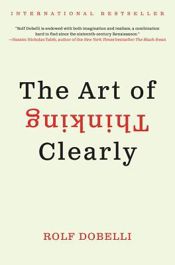The Art of Thinking Clearly

this book has 99 (!) chapters. that seems like a lot, but they’re quite short – some just 2-3 pages. each chapter discusses a cognitive fallacy or bias of some kind. things like:
Survivor bias
Confirmation bias
Feature positive preference
These are mental potholes that we fall prey to again and again, whether we realize it or not. Each chapter discusses a single item, explaining some history (if it has any), and examples of how we might encounter it in our day-to-day lives.
The book was exactly what I was looking for. I’ve collected examples of cognitive fallacies for a while now, and this book is a rich source of many that I sort of knew about, but couldn’t have named. However, there are simply so many in this book, that finishing it the first time might just be the first step. You’d almost have to read this book twice, or even keep it by the bedside and re-read a couple chapters a night for a year or so to make sure they imprint.
The Wall Street Journal savaged the book a bit for this same reason:
I can’t quite recall at what point in his book I slipped into a coma.
Another weird quirk: Nassim Taleb worship. Taleb is the author of “Black Swan” and “Antifragile,” and he must be a mentor or something to the author (he’s mentioned in the acknowledgments as the person who talked the author into writing the book). Taleb is mentioned over and over – probably in a dozen different chapters, always as a sage source of knowledge or someone who knew things that others didn’t. One would almost come away thinking Taleb bankrolled the book as a PR exercise.
(True story: a couple years ago, I stopped reading Taleb’s “Antifragile” because of the palpable narcissism. Taleb seemed more interested in talking about himself than about his stated subject. After this book, it feels like Taleb’s narcissism can’t be contained in his own books, and has infected others.)
Regardless, the book is a good overview of cognitive bias and fallibility. The chapters are short, and it can be read in bits and pieces. It has flaws, certainly, but it’s still worth reading.
Book Info
- I have read this book. According to my records, I completed it on .
- A hardcover copy of this book is currently in my home library.